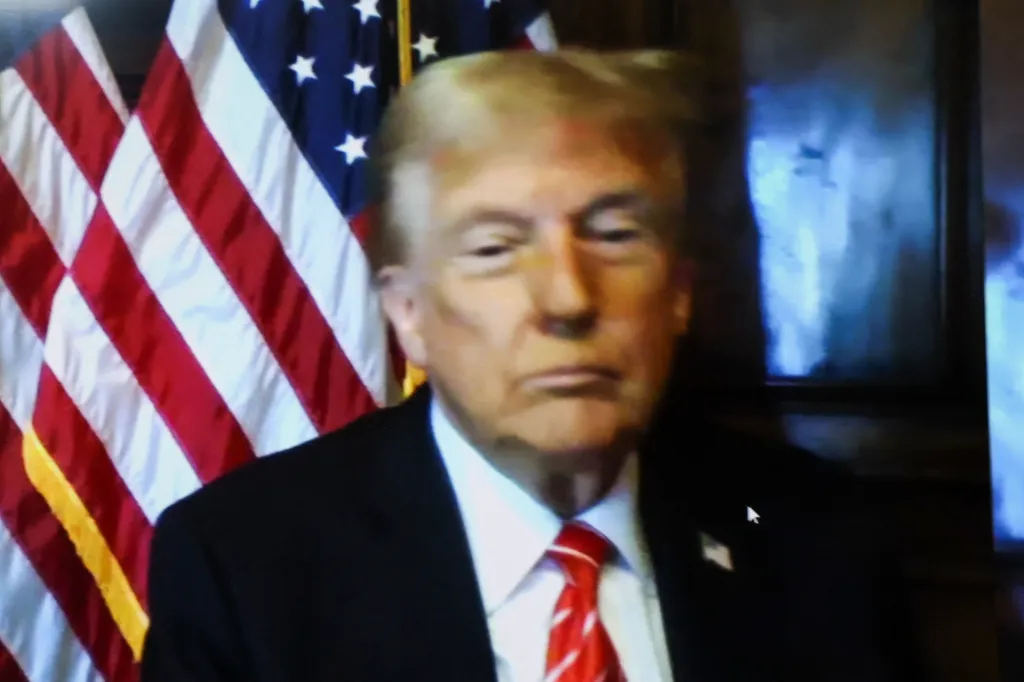
President-elect Donald Trump will enter the White House this month as a felon, but will serve no jail time under a sentence handed down this morning in New York for his criminal conviction in a hush-money trial that angered him and his supporters but didn’t prevent him from reclaiming the presidency.
With an unconditional discharge, Trump also will have no incarceration, fine or probation, but his felony conviction still stands. Under New York law, such sentences are given when the judge determines that no purpose is served in imposing a punishment.
With the U.S. Supreme Court denying his last-minute bid to put off sentencing, Trump found himself facing New York State Supreme Court Justice Juan Merchan for one last time, but not in person. He was given the option by Merchan to attend his hearing remotely, and chose to appear by video link for a sentencing that had been delayed by his re-election amid a flurry of legal appeals.
After imposing the sentence, Merchan said, “Sir, I wish you godspeed as you assume a second term in office.”
Before the sentence was handed down, Trump addressed the court, once again bashing prosecutors for bringing the charges in the first place. “It was done to damage my reputation so that I would lose the election, and obviously it didn’t work,” he said. He defended his conduct, contending that all he was doing was listing payments to then-attorney Michael Cohen as “legal expenses,” “and for this I got indicted.”
“I would just like to say that I was treated very. very unfairly, and thank you very much,” he said to Merchan.
Prosecutors did not challenge a sentence of unconditional discharge, but lead D.A. Joshua Steinglass emphasized that Trump’s status as a convicted felon remained.
Trump logged on knowing that his sentence would be light under the terms of an “unconditional discharge” that the judge had already announced he would apply to a defendant preparing to re-occupy the country’s highest political office ten days from now.
Indicted in 2023, Trump was convicted in May after a six-week trial on 34 counts of falsifying business records in an attempt keep a potential sex scandal from derailing his first presidential campaign, in 2016.
A jury in Manhattan found Trump guilty of illegally concealing payments to a porn star, Stormy Daniels, who said she had had a sexual liaison with Trump years earlier — an affair Trump has denied. Prosecutors from the Manhattan District Attorney’s office argued in court that Trump and his lawyer, Michael Cohen, concocted an illegal conspiracy to influence the 2016 presidential election, with Cohen paying Daniels $130,000 for her silence and Trump reimbursing Cohen through a series of payments falsely billed as attorney fees.
Prosecutors said the $130,000 Cohen paid Daniels in the closing days of the 2016 campaign was an undeclared campaign contribution and an act of election interference that kept voters blind to his alleged indiscretions.
Some legal observers called the prosecution’s case a novel application of New York business fraud and election law. But jurors who saw photographs of the checks made out to Cohen — some of which Trump signed in his first months inside the White House — were persuaded, and convicted Trump on all 34 counts in the indictment.
The trial itself featured a parade of witnesses from Trump’s life before and during his rise in national politics, including Daniels, Cohen, tabloid publisher David Pecker, assorted Trump Organization employees, and a Trump White House aide, Hope Hicks, who wept on the stand as she concluded her testimony.
In the hallway outside Merchan’s courtroom, Trump held daily impromptu press conferences where he raged at Merchan and Manhattan District Attorney Alvin Bragg, and depicted the trial as a political prosecution orchestrated by Democrats. A rotating cast of supporters and family members stood in the hallway behind him as he repeatedly tested the boundaries of a gag order imposed by Merchan that had already lead to several thousand dollars in fines.
Trump and his lawyers fought aggressively to keep this sentencing from happening, arguing that it imposed unreasonable restrictions on an incoming president, even without jail time, and that the conviction itself could not stand once he’d been re-elected. The lawyers cited an expansive U.S. Supreme Court ruling in 2024 that shields a sitting president from criminal prosecution for official acts. That ruling, and Trump’s re-election in November, effectively demolished the federal cases against Trump for attempting to overturn his 2020 election loss and for mishandling classified documents. But the Manhattan DA said Trump was a candidate, not president, when he broke state law by scheming to keep Daniels from going public. The defense team’s immunity and presidential hardship arguments failed to sway Merchan or New York appeals court judges, who turned down Trump’s motions.
The U.S. Supreme Court followed suit on Thursday evening, declining to intervene with a terse, ten-line order — issued on a 5-4 ruling — that said Trump would have to wait until after his sentencing to conduct further appeals.
Despite their failure to win an acquittal or a sentencing delay, or get the verdict overturned, three lawyers representing Trump in the New York criminal case — Todd Blanche, Emil Bove and D. John Sauer — are poised to join his new administration in high-ranking Justice Department and White House roles.
Get our Breaking News Alerts and Keep your inbox happy.





